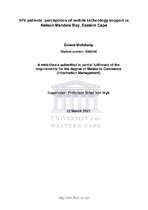| dc.contributor.advisor | Van Wyk, Brian | |
| dc.contributor.author | Mofokeng, Dalene | |
| dc.date.accessioned | 2021-03-25T11:06:23Z | |
| dc.date.available | 2021-03-25T11:06:23Z | |
| dc.date.issued | 2021 | |
| dc.identifier.uri | http://hdl.handle.net/11394/8050 | |
| dc.description | Magister Commercii (Information Management) - MCom(IM) | en_US |
| dc.description.abstract | South Africa has one of the largest HIV and AIDS burdens in the world, with an estimated7.52 million people living with HIV in 2018. The antiretroviral therapy (ART) programme is the biggest and most costly programme in the country, with 3.7 million people enrolled as of 2017. The success of antiretroviral therapy is dependent on adherence to medication and long-term retention in care. It has been reported that support groups can improve the treatment adherence of patients and their retention in care. However, enrolment in adherence support groups is voluntary, and the abovementioned success thereof is dependent on the commitment of the patient to active participation in the group. It is estimated that about 80% of adults and young people own at least one mobile phone, which makes this technology suitable to improve communication and enhance interaction amongst support group members. | en_US |
| dc.language.iso | en | en_US |
| dc.publisher | University of Western Cape | en_US |
| dc.subject | Mobile technology | en_US |
| dc.subject | Text messaging | en_US |
| dc.subject | Support groups | en_US |
| dc.subject | Antiretroviral treatment | en_US |
| dc.subject | Treatment supporters | en_US |
| dc.title | HIV patients’ perceptions of mobile technology support in Nelson Mandela Bay, Eastern Cape | en_US |
| dc.rights.holder | University of Western Cape | en_US |

